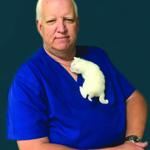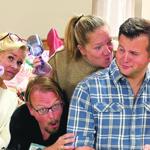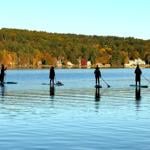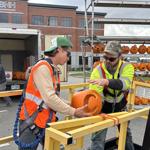BRISTOL — The secret to Newfound Memorial Middle School’s advancement to a ranking in the top 25% in the state, according to Principal Chris Ulrich, was “capitalizing on what’s at hand.”
The expression comes from a quote by Mike Schomoker in “Results: The Key to Continuous School Improvement”: “We must begin where we are and move forward immediately by starting small and capitalizing on what’s at hand.”
“This appeals to the former economics teacher in me,” Ulrich said, “because schools are institutions of finite resources, and so we have to use the resources we have efficiently. So, for instance, if we want a math interventionist, well, it means that something’s got to give. ... We looked at our math proficiency scores and said, ‘We want those to be higher.’ ... So we trade a world language teacher for a math interventionist. ... It was a good investment for the taxpayers of this district.
"It isn’t that we've done anything radical, and it isn't that we've done anything expensive. It's that we're finding ways to make the system we have at Newfound Memorial Middle School the most efficient it can be to really generate academic excellence for students.”
U.S. News & World Report’s ranking of the Best Middle Schools in New Hampshire placed Newfound Memorial Middle at No. 28, ahead of Campton Elementary School and four behind Gilford. Belmont ranked 47 in the report, Moultonborough 62, Winnisquam 64, Laconia 74, Franklin 84, and Inter-Lakes 86.
“I live in Bow,” Ulrich said. “I pay a lot of money and taxes to live in Bow, and that was bit of a kick in the — we’ll say teeth — to find out that Newfound Memorial Middle School was doing so much better than the place I pay that $8,000 a year in property taxes. But we beat them. In fact, not only did we beat them, [they were] three behind.
“And here’s the kicker: When they ranked Newfound Memorial Middle School, they got our math proficiency rates wrong. They said that we had a 38% proficiency rate, and it’s actually 48%. We’re actually in the top 20 of the state, OK, the top 20 out of 111 middle schools.”
Ulrich made the comments during a presentation by sixth grade literacy teacher Renee Taylor and math interventionist Erin Ingemundsen, who were explaining to the Newfound Area School Board the steps the middle school has been taking to “raise the bar” on education.
Just prior to the COVID pandemic, in 2019, the middle school transitioned to a competency-based grading system, where a passing grade was 1 or better on a 4-point scale. Most students had a 70-minute study hall each day. Students who did not pass their class were encouraged to attend a summer school, but it was based on “seat time.”
“If you sat there, you minded your business, you did the work, then you got credit for summer school, but again, entirely based on seat time,” Ulrich said. “And there weren’t any significant ... academic interventions if a student didn’t pass summer school. So that’s where we were several years ago. So what we’re going to tell you today is what we’ve done to change it.”
The school increased the passing grade from 1 to 2, which roughly corresponds to a “C” on the Carnegie Scale. Class times increased from 70 minutes to nearly an hour, eliminating the study halls.
“Kids will have literacy, math, science, and social studies every day,” Ulrich said. “If you want to pass a class at Newfound Memorial Middle School, you can’t pass most of the competencies. You can’t pass an average of the competencies. You have to pass every single competency.
"If we say we’re a competency-based school, we’re going to be truly competency-based, because in the end, our goal is to prepare every single one of our kids for the rigors of high school.”
Taylor used the example of social studies to explain “competencies.”
“You might have a geography competency, and within that you have skills like being able to read a map and be able to measure with keys,” she said.
With an average of eight competencies per course, and with students taking six classes at a time, that makes 48 competencies they need to demonstrate in order to pass.
With the new approach, proficiency scores in English and language arts increased by 17 points between 2022 and 2024, almost reaching the pre-COVID levels. (Scores across the board fell during the pandemic.) Math scores improved by 21%, and science by 6%. Both of those gains were higher than before COVID.
Taylor and Ingemundsen explained how they track students’ progress to identify areas where they are falling behind and how they get help to those students.
“Mr. Ulrich will actually pull in kids who are not passing classes and form a plan with them,” Taylor said. “Oh, it’s kind of scary getting called into the office, right? So you want to get [the assignments] done.”
Ingemundsen explained other forms of intervention, including a homework club.
“With the loss of funding for Project Promise [a grant-funded after-school program] at the middle school, we had to get creative, and we now offer this homework club Monday through Thursday, from 3 to 4:30” p.m. Ingemundsen said. “It’s modeled similarly to Project Promise, but it runs a half an hour longer.”
The middle school also built a two-day-a-week support block into the schedule by shortening classes by a few minutes to create 30 minutes on Tuesdays and Thursdays where teachers can provide extra help if needed.
“The other nice thing about that is you have access to your other teachers,” Ingemundsen said. “So if your first block class is science and you need help in social studies, you can contact your social studies teacher and be like, ‘Listen, can I pop by on Tuesday?’”
The help is not restricted to students who are failing, she said.
“Kids that participate in math intervention are not kids who are typically on the failing list,” Ingemundsen said. “So a lot of people here ... are the students who have a really good foundation, and we want to support them and sort of give them that little boost that they need to really excel and perhaps be above the 60th percentile, which would be performing at an above-average level.”
Students in literacy, math, science, or social studies who are in competency recovery receive additional academic support once a day during block one.
Summer school no longer operates on the basis of seat time. Students who attend because of failure at a particular competency do not have to stay throughout the month-long summer session. They are there only long enough to gain the required competency. Once the teacher signs off to say they have attained that skill, they can leave.
Even with that help, some students still may be failing. They will be held back rather than passing to the next grade, but unlike class retention, they will not have to repeat a whole class.
“They’re going to be working on the competencies that they didn’t master,” Taylor said. “So in the two years that we’ve been doing this, I’ve had five students have to recover my class.”
In one case, the student spent two weeks working on the skill and was able to pass, allowing him to leave.
“Whereas some students might take the whole first quarter, and most kids only take up to the first quarter, they might, again, only take a couple weeks, a month, or that time frame. But they’re only focusing on the things that they didn’t master, rather than completely retaking the course,” she explained.
Superintendent Paul Hoiriis summed up, “If a kid fails all four core subjects, we have a 12-step process for intervention: homework club, competency recovery, being on the failing list, multiple parent-teacher conferences. But if our job is to get a kid ready for high school and they can’t pass their four cores, and their test scores show that they’re significantly below where they should be, we have a policy in place that allows us to do grade-level recovery. We have to get them ready for high school, and we don’t do this lightly.”


















(0) comments
Welcome to the discussion.
Log In
Keep it Clean. Please avoid obscene, vulgar, lewd, racist or sexually-oriented language.
PLEASE TURN OFF YOUR CAPS LOCK.
Don't Threaten. Threats of harming another person will not be tolerated.
Be Truthful. Don't knowingly lie about anyone or anything.
Be Nice. No racism, sexism or any sort of -ism that is degrading to another person.
Be Proactive. Use the 'Report' link on each comment to let us know of abusive posts.
Share with Us. We'd love to hear eyewitness accounts, the history behind an article.